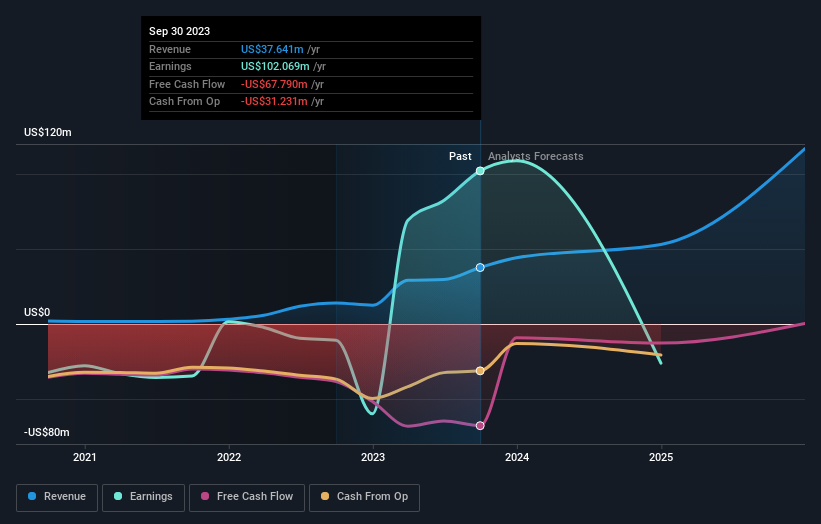- Canada
- /
- Oil and Gas
- /
- TSX:EFR
Institutions along with individual investors who hold considerable shares inEnergy Fuels Inc. (TSE:EFR) come under pressure; lose 7.8% of holdings value

Key Insights
- Significant control over Energy Fuels by individual investors implies that the general public has more power to influence management and governance-related decisions
- 37% of the business is held by the top 25 shareholders
- Insiders have been selling lately
Every investor in Energy Fuels Inc. (TSE:EFR) should be aware of the most powerful shareholder groups. We can see that individual investors own the lion's share in the company with 52% ownership. That is, the group stands to benefit the most if the stock rises (or lose the most if there is a downturn).
While institutions, who own 46% shares weren’t spared from last week’s CA$135m market cap drop, individual investors as a group suffered the maximum losses
Let's delve deeper into each type of owner of Energy Fuels, beginning with the chart below.
Check out our latest analysis for Energy Fuels

What Does The Institutional Ownership Tell Us About Energy Fuels?
Many institutions measure their performance against an index that approximates the local market. So they usually pay more attention to companies that are included in major indices.
As you can see, institutional investors have a fair amount of stake in Energy Fuels. This suggests some credibility amongst professional investors. But we can't rely on that fact alone since institutions make bad investments sometimes, just like everyone does. It is not uncommon to see a big share price drop if two large institutional investors try to sell out of a stock at the same time. So it is worth checking the past earnings trajectory of Energy Fuels, (below). Of course, keep in mind that there are other factors to consider, too.

We note that hedge funds don't have a meaningful investment in Energy Fuels. Our data shows that ALPS Advisors, Inc. is the largest shareholder with 5.4% of shares outstanding. Mirae Asset Global Investments Co., Ltd. is the second largest shareholder owning 5.4% of common stock, and BlackRock, Inc. holds about 5.2% of the company stock.
A deeper look at our ownership data shows that the top 25 shareholders collectively hold less than half of the register, suggesting a large group of small holders where no single shareholder has a majority.
While it makes sense to study institutional ownership data for a company, it also makes sense to study analyst sentiments to know which way the wind is blowing. Quite a few analysts cover the stock, so you could look into forecast growth quite easily.
Insider Ownership Of Energy Fuels
While the precise definition of an insider can be subjective, almost everyone considers board members to be insiders. Management ultimately answers to the board. However, it is not uncommon for managers to be executive board members, especially if they are a founder or the CEO.
Most consider insider ownership a positive because it can indicate the board is well aligned with other shareholders. However, on some occasions too much power is concentrated within this group.
We can report that insiders do own shares in Energy Fuels Inc.. It is a pretty big company, so it is generally a positive to see some potentially meaningful alignment. In this case, they own around CA$28m worth of shares (at current prices). If you would like to explore the question of insider alignment, you can click here to see if insiders have been buying or selling.
General Public Ownership
The general public -- including retail investors -- own 52% of Energy Fuels. This level of ownership gives investors from the wider public some power to sway key policy decisions such as board composition, executive compensation, and the dividend payout ratio.
Next Steps:
It's always worth thinking about the different groups who own shares in a company. But to understand Energy Fuels better, we need to consider many other factors. For example, we've discovered 3 warning signs for Energy Fuels (2 are concerning!) that you should be aware of before investing here.
If you are like me, you may want to think about whether this company will grow or shrink. Luckily, you can check this free report showing analyst forecasts for its future.
NB: Figures in this article are calculated using data from the last twelve months, which refer to the 12-month period ending on the last date of the month the financial statement is dated. This may not be consistent with full year annual report figures.
Valuation is complex, but we're here to simplify it.
Discover if Energy Fuels might be undervalued or overvalued with our detailed analysis, featuring fair value estimates, potential risks, dividends, insider trades, and its financial condition.
Access Free AnalysisHave feedback on this article? Concerned about the content? Get in touch with us directly. Alternatively, email editorial-team (at) simplywallst.com.
This article by Simply Wall St is general in nature. We provide commentary based on historical data and analyst forecasts only using an unbiased methodology and our articles are not intended to be financial advice. It does not constitute a recommendation to buy or sell any stock, and does not take account of your objectives, or your financial situation. We aim to bring you long-term focused analysis driven by fundamental data. Note that our analysis may not factor in the latest price-sensitive company announcements or qualitative material. Simply Wall St has no position in any stocks mentioned.
About TSX:EFR
Energy Fuels
Engages in the exploration, recovery, recycling, exploration, operation, development, permitting, evaluation, and sale of uranium mineral properties in the United States.
High growth potential with excellent balance sheet.
Similar Companies
Market Insights
Community Narratives



